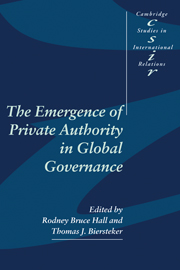Book contents
- Frontmatter
- Contents
- List of figures
- List of tables
- List of contributors
- Preface and acknowledgements
- Part I Introduction: theorizing private authority
- Part II Market authority: globalization and “globaloney”
- Part III Moral authority: global civil society and transnational religious movements
- 6 “Regulation for the rest of us?” Global civil society and the privatization of transnational regulation
- 7 The global dimensions of religious terrorism
- Part IV Illicit authority: mafias and mercenaries
- Part V Conclusions and directions
- Bibliography
- Index
- CAMBRIDGE STUDIES IN INTERNATIONAL RELATIONS
6 - “Regulation for the rest of us?” Global civil society and the privatization of transnational regulation
Published online by Cambridge University Press: 22 September 2009
- Frontmatter
- Contents
- List of figures
- List of tables
- List of contributors
- Preface and acknowledgements
- Part I Introduction: theorizing private authority
- Part II Market authority: globalization and “globaloney”
- Part III Moral authority: global civil society and transnational religious movements
- 6 “Regulation for the rest of us?” Global civil society and the privatization of transnational regulation
- 7 The global dimensions of religious terrorism
- Part IV Illicit authority: mafias and mercenaries
- Part V Conclusions and directions
- Bibliography
- Index
- CAMBRIDGE STUDIES IN INTERNATIONAL RELATIONS
Summary
Introduction
The protests that took place in Seattle during the November 1999 meeting of the World Trade Organization (WTO), and which have occurred periodically since then, illustrate a growing public demand for greater transparency, representation, and regulation under conditions of globalization. While much rhetoric was expended condemning the WTO for its intrusions on national sovereignty, the alternatives proposed by the groups marching in the streets were less clear. Inasmuch as a return to the prosperity and political conditions of the 1960s is not on the cards, and a return to the anarchic and “beggar-thy-neighbor” circumstances of the 1930s is manifestly undesirable, what constitutes a politically viable response to the negative impacts of globalization? Or, to put the question another way, how can “regulation for the rest of us” be achieved?
We argue here that, in the interests of economic competitiveness and growth, nation-states have yielded a substantial amount of their domestic regulatory authority to transnational regimes and organizations, such as the WTO, the International Monetary Fund, and various other international regimes and institutions. While globalization is much discussed in terms of the mobility of capital and production, and much feared and opposed for its disruptive impacts on labor and social organization more generally, the question of regulation, per se, has not been much considered. Nonetheless, a critical set of problems arising from contemporary globalization are the social, economic and environmental externalities that are not being addressed within the existing international system of regulatory conventions and regimes.
- Type
- Chapter
- Information
- The Emergence of Private Authority in Global Governance , pp. 115 - 140Publisher: Cambridge University PressPrint publication year: 2002
- 35
- Cited by

